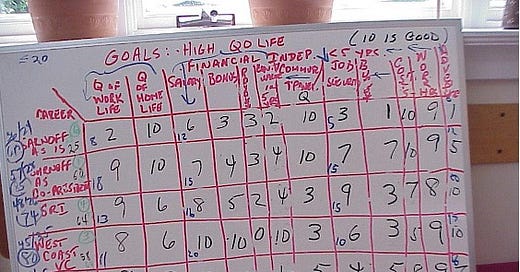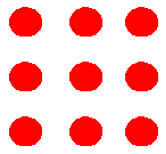The problem I have always had to overcome when making a major change in my life is “analysis paralysis.” You have probably experienced the same. In this post, I write about a life change that I personally had to decide on. I hope my solution may help you and even offer new elements for you to consider.
In 2001, I was a vice president at RCA Labs (Sarnoff) in Princeton, NJ, leading the Math, Computer Science, and Ventures division. Later that year, I was offered a position as a vice president at Stanford Research Institute (SRI) in Menlo Park, CA, where I would manage all business development and ventures.
I considered many options when deciding between staying at Sarnoff and going to SRI. Here’s a chart I made in 2001 while talking with my best friend, Greg Cherlin, who was also a mathematician. We attempted to compare the alternatives and benefits of each approach.
You can imagine the difficulty of arriving at a decision. Each element of the chart was very important to me, and the elements were largely unquantifiable.
In truth, while the process did clarify the issues, the chart didn’t help very much. I knew in my gut that going to SRI would be a better choice for work. What I wasn’t sure of was what it would do to my wife Lisbeth and our family. We had a very good life in Princeton. We had a home we loved and work that I enjoyed; our children all grew up there, and we had made many good friends over the years.
Asking Lisbeth to move was the issue that kept me worried many nights. I knew it might be more painful for her than for most people. Let me explain why by giving you a brief history:
Lisbeth was born and raised in Denmark, and we met when she was taking a gap year after graduating from the Danish Gymnasium. For that gap year, she lived with a warm and loving family in Princeton, NJ, as an “au pair.” At the same time, I was an invited member at the Institute for Advanced Study in Princeton, spending all my time doing research in mathematics.
One day, I was invited to a party of grad students, au pair girls, and others, and Lisbeth and I met there. She was with her boyfriend, a student at Princeton University, and so I found myself talking with many other au pair girls. After our introduction, I even forgot her name and called her “Anna,” to her slight irritation. At the next party, her boyfriend was studying for exams. And it was "love at second sight.” We spent every day of the summer together, after which she returned to Denmark with a plan to spend two years there getting a degree as a trilingual correspondent. We decided to get engaged and stay together, even though we were an ocean apart, during those two years. We wrote many letters, had many phone calls, and made many visits to each other during holidays.
After Lisbeth graduated from the trilingual correspondent school, she joined me in the U.S., uprooting herself from the rest of her family in Denmark and from all the friends she grew up with. Not one of her family or friends lived in the U.S., and I always felt guilty about that.
We lived in Albany, New York, for two years while I was a professor of mathematics at SUNY at Albany. I then decided to leave academia to accept an offer to join RCA Labs, known as the David Sarnoff Research Center, in Princeton. We moved to Princeton and lived there for 26 years. We loved our life there and grew strong roots with family and friends. I promised myself I would never ask her to move again.
Deciding to move to California meant that I would indeed have to ask Lisbeth to move again and tear up her roots one more time. In truth, I didn’t think I could do it.
Together, we decided that if the position the CEO of Sarnoff offered me was equally attractive to the position that SRI offered me, I would stay at Sarnoff. But the CEO didn’t. He was going to offer another team member the position of running ventures for health and biotech, and I would run ventures for information technologies. I felt that splitting these positions was a terrible idea. At this point, we knew our decision was made.
Then, Lisbeth and I came up with a solution to the problem of moving and starting anew again, tearing up our roots, which helped us greatly. Our youngest son, Peter, was graduating high school, and we would become “empty nesters”. I proposed that as “empty nesters,” we agree to go to SRI and take a “four-year course in adventure.” When we “graduated,” we would decide to either stay in California or return to Princeton. We would keep our house in Princeton and rent it so that we might be able to return.
We arrived in Palo Alto, and our new life began.
I remember talking with Lisbeth after arriving, and her first reaction was sadness at leaving her old life in Princeton behind. It wasn’t a good feeling. One day, she told me she had had a vision of a gift-wrapped package floating off into the universe. She realized that the package was our family life in Princeton. That life was over, and we didn’t know what our new life might be.
Then, we talked about this being our new adventure, and I compared it to the Nine Dots puzzle. In that puzzle, nine dots are drawn, and the player is challenged to draw at most four straight lines with a pencil, never picking up the pencil and touching each dot.
Try it yourself:
Below are nine dots.
The attempt below failed because it took 5 straight lines.
The solution below is the correct answer. You need to realize that the rules never say that you can’t go outside the dots. In fact, you have to. There’s no other way to solve the puzzle.
I told Lisbeth that we were going outside our nine dots. She responded without hesitation, “I liked my nine dots! I want to stay inside my nine dots! I don’t even know where the local grocery store is!” We laughed together. Shortly afterward, she figured out where the grocery store was. And as time passed, we really did start a new life. Going outside the nine dots was exhilarating.
Two years later (not even the four years we agreed on), we talked about our “course in adventure.” I asked if we should consider moving back to Princeton. Lisbeth said, “I think I graduated! I love our home and friends in Palo Alto, and California is so beautiful.”
Now, after our decision to come to California, Lisbeth and I will be celebrating our 23rd year here. We love our life in California, especially since all our children discovered its beauty, and we live close to them and our seven grandchildren.
In hindsight, if we hadn’t made that decision to leave and join SRI and “take a course in adventure,” the differences in our lives would have been monumental:
I was scheduled to fly on the fateful 9/11 flight 93 to my monthly venture forum meeting at SRI. But the day before, my secretary changed my flight on United Flight 93 to a later flight. She explained that I had already traveled so extensively to interviews for the new position there that I seemed very tired from travel, and should relax a bit longer. This post describes it further. And so if I had not been having those interviews, I would have stayed on flight 93.
I would not have had the opportunity to co-found many successful ventures.
Lisbeth and I wouldn’t have had a life in California full of new adventures and friends while still keeping our old friends in Princeton
Our children would likely not have moved to California, living near us, with all the love and happiness that comes with this
And on and on
So, what is my advice to you on how to consider opportunities?
Consider your life. Are you happy, enthusiastic, and passionate, or do you feel a sense of heaviness, boredom, and tiredness? Does the thought of changing your life energize you?
Consider the new life you might have. Is there a good chance for great value and opportunity in your life - an opportunity that couldn’t even be imagined? Can you “go outside your nine dots”?
Consider whether it is possible for you to “take a course in adventure” and keep a door open to your old life in case of regret.
And here’s a core concept that I think perhaps many people miss: Change itself is good. Change inspires you, energizes you, and excites you. Change offers you opportunities that you could never have conceived of. Change builds your brain cells and creates new learning. As Lisbeth says, “Change clears away the cobwebs in your brain.”
Change gives you an opportunity to start a new life.
Your Venture Coach,
Norman









One thing I learnt is that all the things that make one’s life today may well be different tomorrow, so I tend to not put too much weight into what’s today when making personal decisions for the future.
A long time ago I was confronted with a similar situation after being offered an exciting job with a renowned organization in another country, and we took the plunge (which turned out great). But I also know that, had we stayed in our old lives, those lives would have changed anyways. So the decision was never whether to continue our current lives and "change" but only whether being the driver of change or being driven by change.
Seeing change as energizing, if nothing else, is a good motivation to pursue it.